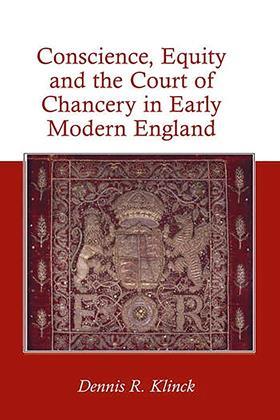Conscience, Equity and the Court of Chancery in Early Modern England
Dennis R Klinck
£39.99, Routledge
★★★★★
Early English legal history seems to involve multiple courts, all complementing – or possibly competing with – each other. Particularly notable is the relationship between equity – enforced by the Court of Chancery – and common law.
In theory, equity was intended to mitigate injustices caused by the rigid and precedent-bound common law, allowing the application of what was often referred to as ‘conscience’. The Court of Chancery was often referred to as a ‘Court of Conscience’; what that meant in practice was rarely obvious.
Klinck takes a deep dive into the meaning of ‘conscience’ in this context. There is much here to unpack. Today, ‘conscience’ has been afflicted by the twin modern fundamentalisms of individualism and autonomy, and has a subjective slant. This is arguably inconsistent with the certainty required by legal judgment. John Selden, a 17th-century legal scholar, argued that conscience could be arbitrary, as the breadth of a chancellor’s conscience could be as variable as the length of his foot.

Marshalling an array of legal and other sources, Klinck argues that in the late medieval and early modern periods, conscience was understood in an objective sense. Rather than the individual’s own subjective sense of right and wrong, conscience was composed of two elements: synteresis – a human faculty to discern the requirements of external ‘moral law’; and conscientia – the capacity to apply reason to the moral law and discern how it should apply to a given situation. Moral law, of course, meant the teaching of the church and holy scripture. Nevertheless, ‘conscience’ implied the application of reason to some objectively ascertainable external source of principles. The final part of the book concentrates on the work of Lord Nottingham, lord chancellor from 1675 to 1682, whose attempts to systematise chancery practice began the development of the more modern, principle-based, equity jurisdiction.
This is a wonderful work; well-researched, scholarly but readable. Klinck draws on a wide range of sources to develop a convincing argument that ‘conscience’ was not a subjective concept in early chancery. As a history obsessive, I consumed this book in a day. It is worth the time for legal – and even general – history lovers, and those with a bit of curiosity about how English law developed.
James E Hurford is a solicitor at the Government Legal Department, London































No comments yet